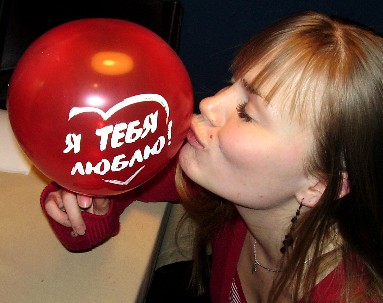«День всех влюблённых» [Valentine’s Day] in Russia Posted by josefina on Feb 14, 2010 in Uncategorized
«На этом воздушном шарике» [on this balloon] it says «я тебя люблю!» [I love you!] But don’t we all not just want to read these words, but have them said to us «вслух» [aloud]?
Today is February 14th, a day known around the world as Valentine’s Day. In Russia this day has a name of its own – though you can say «день святого Валентина» [Saint Valentine’s Day] and nobody would frown at you for doing so – and is called «день всех влюблённых» [the day of everybody in love]. This is from the adjective «влюблённый» (if you’re a man) and «влюблённая» (if you’re a woman) [in love, enamored; amorous, passionate]. But Russian language also has short forms for (almost all) adjectives, which means that you can also say that you’re «влюблён» (if you’re a man) or «влюблена» (if you’re a woman) when you’re in love in Russian – or in love in Russia, for that matter. Both of these two adjectives translate into the same thing in English, seemingly there’s no big difference between them. This is not entirely true, though: the short form (as is general rule) describes a stronger feeling. Or that the same feeling is transitory or temporal. But let’s not talk about that today. Today’s post is not «о кратких прилагательных» [about short adjectives] but about something else entirely – dating in Russia. There’s already been a post on this subject, I am aware. But today we’ll try and steer away from purely lexical and grammatical moments in favor of the cultural context. We’ll try and figure out not only «как ходить на свидание с русским/русской» [how to go on a date with a Russian] but also «что делать на свидании с русским/русской» [what to do on a date with a Russian]. It would be wrong for you to think of me like some kind of «эксперт в этой области» [expert in this area]. Think of me more as a sort of «любитель» [lover; fancier, buff; amateur, dilettante; dabbler] with «опыт» [experience] in this specific area. I may be chronically single, but «сегодня я сходила на свидание с русским» [today I went on a date with a Russian], which means my information may not be universal, but at least it’s up to date!

Making out in the park – «классика жанра» [a classic in the genre], as the Russians would say, and an essential part of «русская романтика» [Russian romance].
Dating in general is difficult. Dating in a foreign country is even more complicated. In Russia – and I’m speaking from experience and not pure prejudice – old-fashion gender presumptions are still the norm. Men in Russia are «мужчины» [men], and subsequently women are «женщины» [women]. But men are men and women are women all over the world, what exactly does this kind of information bring to clear up the question «как?» [how?] to date in Russia? Well, that there are some things that the man generally does on a date, whereas the woman does different things. As a rule Russians dress up for dates (not saying that this does not go for people in other countries as well). Russians do not show up in jeans on a date (I’ve never seen this EVER). If it is a first date – or a special occasion, like today – the man will bring a «роза» [rose] for the lady. It is not recommended for the girl to bring anything for the man (as giving flowers to men can be seen as not respecting their masculinity). It doesn’t always have to be a single red rose – sometimes it may be a whole «букет цветов» [bouquet of flowers]. Once I dated a Russian guy who would bring me gigantic bouquets on every single date. After three dates on one and the same week my room resembled a flower shop. I think it would be safe to say that Russians are a very romantic people. On my date today I received «жёлтую розу» [a yellow rose], but the guy told me that he had wanted to pair with it a «синюю» [blue one] too, and thus give me the Swedish flag in the form of two roses. But he couldn’t find blue roses sold anywhere. Still, a very sweet idea, don’t you think?
It is standard to go for a walk on a date in Russia. No matter how cold (or hot for that matter) it is, Russians love to go on walks. And because most Russian towns are built around rivers or lakes, there’s always a pretty «набережная» [embankment] where this can be done with great pleasure. The traditional (and almost mandatory) «прогулка» [walk, stroll] can take place both before and after someone says «давай где-нибудь посидим и поужинаем» [let us sit down somewhere and have dinner]. If it is a «удачное свидание» [successful date] – when you feel that you like this person and also that this person is into you too – the after-dinner walk will include two important features. First: holding hands. Secondly: the man will carry the girl’s purse. If a Russian man takes your purse, you know it is getting serious! This ‘trick’ I heard about long before it actually happened to me in real life. Back when I was really young and living in Saint Petersburg I had a couple of male Swedish friends who struggled with getting on with Russian girls on dates. Their struggles were fruitless (almost) until a Russian girl told them to try and carry their date’s purse when on a walk after dinner. I don’t know if this ALWAYS works, but in Russia it is considered a nice way of showing that you’re a «джентльмен» [gentleman]. And it doesn’t hurt to try, now does it?

Did you know there’s «памятник группе Битлз» [a monument to the group Beatles] in central Yekaterinburg? Now you know!
After dinner there’s always that awkward moment when you’re trying to understand who’s going to pay for it all. Usually in Russia, the man pays. This used to be tradition in other countries back in the days (my mother has told me tales of this practice), but nowadays at least in the country where I’m from it is most common to split the check. Because I have a tendency to want to pay for myself and because the Russians I have dated tend to take offence when I do this, experience has taught me a new ‘trick’. At the end of dinner I always make a quick visit to the restroom. If the check has already been paid (this is usually indicated by the fact that the man stands ready with your coat in his hands to place it on your shoulders) by the time I get back, I know how we’re rolling tonight. If not, then I will undoubtedly try and flaunt my Scandinavian roots.
Among other things to be aware of on dates with Russians: 1) don’t fight it if they want to open the door for you. Simply let it happen; and 2) don’t be surprised if a Russian man will get off the bus/tram before you and give you his hand to lean on when you’re getting off. Not only on dates do Russian men give women a hand when getting off public transportation. Even male friends will. Sometimes even strangers give you their hands to lean on as you’re getting off – especially if the steps are slippery and they see that you’re wearing heels (most women in Russia wear heels anyway, so I can see from what need this came into practice). At first this tradition might seem a bit weird. Particularly if you’re wearing sneakers and consider yourself a lot more steady than the man giving you his hand. But after a while you’ll get so used to it that you might even get upset when this doesn’t happen, for example, in Stockholm or London.
The important thing when dating in Russia – and when dating in general, no matter what country you’re in at the moment – is to keep not only an open heart, but also an open mind. Or as the Russians say: «кто не рискует, тот шампанского не пьёт!» [the one who doesn’t take risks doesn’t (get to) drink champagne!]. Gender may be a cage to some, but sometimes there’s a beauty in discovering that we’re not exactly equal after all…

Build vocabulary, practice pronunciation, and more with Transparent Language Online. Available anytime, anywhere, on any device.





Comments:
Colin:
The problem with insisting on absolute equality (which nowadays is obvious) is that it frequently ends up being misunderstood to mean men and women are the same, with the same needs, drives, likes and dislikes etc. It’s interesting to see that you, as a Swedish woman, can still appreciate a culture that has a slightly old-fashioned take on the subject. Sometimes it feels as if we in the West have thrown the baby out with the bathwater as far as courtesy is concerned;-)
Ken:
I really enjoyed this blog. It is so interesting to know the little tricks and habits of people in other countries especially so in Russia since it is a country in which we are interested. Thank you!
Ken